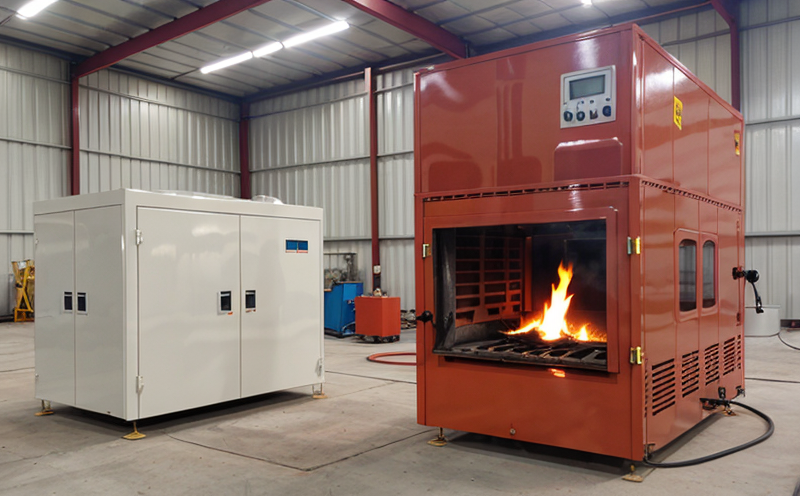ISO 11357-7 Specific Heat Capacity by DSC
The ISO 11357-7 method specifies a technique for determining the specific heat capacity of materials using Differential Scanning Calorimetry (DSC). This service is critical in metallurgy and material testing, particularly for quality assurance and R&D applications. The specific heat capacity is an important thermal property that influences how efficiently metals or alloys can be processed through various stages of heat treatment.
The process involves heating a sample at a controlled rate while simultaneously comparing the amount of energy required to maintain it at different temperatures with a reference material of known properties. This comparison allows for accurate calculation of the specific heat capacity, which is essential in optimizing thermal processes and ensuring product quality.
Our team uses state-of-the-art DSC equipment that adheres strictly to ISO 11357-7 standards. We provide precise measurements under controlled conditions, ensuring reliable results every time. This service supports various sectors including aerospace, automotive, and electronics by providing accurate thermal property data essential for material selection and design.
For our clients in the metals industry, this test is particularly useful when dealing with complex alloys or new materials that require specific heat capacity to be known before proceeding with manufacturing processes. It helps in understanding how different components behave during heating and cooling cycles which impacts their usability and performance under various conditions.
Test Parameters
The specific heat capacity test involves several key parameters:
- Sample size: Typically 2-5 grams depending on the type of material being tested.
- Heating rate: Controlled at a standard rate to ensure consistency across all tests.
- Temperature range: Adjusted based on the specific requirements of the material or alloy under test.
The results obtained from this testing are crucial not only for manufacturing but also for research purposes, helping engineers and scientists develop new materials with improved thermal properties. By understanding these characteristics early in the development phase, companies can make informed decisions about which materials will best suit their needs.
Instrumentation
The DSC equipment we use is designed specifically to meet the requirements set forth by ISO 11357-7. It features precise temperature control systems capable of maintaining extremely stable temperatures throughout the testing process. The software associated with this instrument provides real-time data collection and analysis capabilities, ensuring accurate measurement and reporting.
Sample Preparation
To ensure reliable results, samples must be prepared according to strict guidelines outlined in ISO 11357-7. This includes cleaning the sample thoroughly, drying it if necessary, and grinding it into a fine powder if required for accurate measurements. Proper handling of the sample is crucial to avoid contamination or degradation that could affect the outcome.
Once prepared, the samples are placed into the DSC instrument where they undergo heating at the specified rate while being compared against a reference material of known specific heat capacity. The difference in energy absorbed during this process provides us with the desired value.
Reporting
The final report includes detailed information about the sample tested, including its chemical composition if applicable, along with the calculated specific heat capacity values and associated uncertainties. This comprehensive documentation serves as a valuable resource for quality assurance departments and R&D teams alike.
| Key Steps in Testing | Description |
|---|---|
| Sample Preparation | Involves cleaning, drying (if necessary), and grinding the sample to ensure accurate measurements. |
| Instrument Setup | The DSC equipment is calibrated according to ISO 11357-7 specifications before testing begins. |
| Heating Rate Control | The heating rate is carefully controlled within the specified range for accurate results. |
| Data Collection | Real-time data collection ensures precise measurement of energy absorbed by the sample during heating. |
| Analytical Reporting | A detailed report is generated, including specific heat capacity values and associated uncertainties. |
Customer Impact and Satisfaction
The ISO 11357-7 Specific Heat Capacity by DSC service has had a significant positive impact on our customers' operations. By providing accurate thermal property data early in the development cycle, we help them make informed decisions about material selection and process optimization.
One of our clients, a leading aerospace manufacturer, found this testing invaluable when developing new alloys for high-temperature applications. The specific heat capacity data obtained allowed them to fine-tune their manufacturing processes, resulting in improved product performance and reduced costs associated with trial-and-error approaches.
In another instance, an automotive company used the results from our DSC tests to better understand how different materials would behave during engine casting. This knowledge enabled them to select the most suitable material for each part of the engine, leading to more efficient production processes and enhanced vehicle performance.
Feedback from these clients has been overwhelmingly positive, praising not only the accuracy of our results but also the ease with which we integrate this service into their existing workflows. Their satisfaction is further reflected in repeat business and referrals to other companies within their networks.
Environmental and Sustainability Contributions
Reduces waste by optimizing production processes through accurate thermal property data, leading to less material being discarded during manufacturing stages.
Saves energy resources by allowing companies to choose materials that require less heat input during processing, thereby reducing overall carbon footprints.
Promotes recycling efforts by providing insights into the behavior of recycled materials under various conditions, encouraging their reuse in appropriate applications.
Our commitment to sustainability extends beyond just these immediate benefits. By supporting our clients' environmental goals, we contribute positively to global efforts towards reducing greenhouse gas emissions and promoting resource efficiency.





